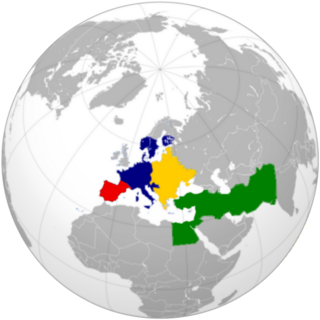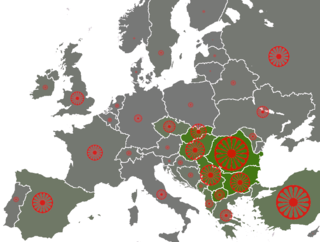Related Research Articles

The Romani, also spelled Romany or Rromani and colloquially known as the Roma, are an ethnic group of Indo-Aryan origin who traditionally lived a nomadic, itinerant lifestyle. Linguistic and genetic evidence suggests that the Romani originated in the Indian subcontinent, in particular the region of present-day Rajasthan. Their subsequent westward migration, possibly in waves, is now believed by historians to have occurred around 1000 CE. Their original name is from the Sanskrit word डोम, ḍoma and means a member of the Dom caste of travelling musicians and dancers. The Roma population moved west into the Ghaznavid Empire and later into the Byzantine Empire. The Roma are thought to have arrived in Europe around the 13th to 14th century. Although they are widely dispersed, their most concentrated populations are located in Bulgaria, Hungary, Romania, Spain, and Turkey.

The Romani Holocaust or the Romani genocide was the planned effort by Nazi Germany and its World War II allies and collaborators to commit ethnic cleansing and eventually genocide against European Roma and Sinti peoples during the Holocaust era.
The Romani people have long been a part of the collective mythology of the West, where they were depicted as outsiders, aliens, and a threat. For centuries they were enslaved in Eastern Europe and hunted in Western Europe: the Pořajmos, Hitler's attempt at genocide, was one violent link in a chain of persecution that encompassed countries generally considered more tolerant of minorities, such as the United Kingdom. Even today, while there is a surge of Romani self-identification and pride, restrictive measures are being debated and passed by democratic states to curb the rights of the Romani people.

Viviane Adélaïde Reding is a Luxembourgish politician and a former Member of the European Parliament (MEP) from Luxembourg. She is a member of the Christian Social People's Party, part of the European People's Party. She previously served as European Commissioner for Education and Culture from 1999 to 2004, European Commissioner for Information Society and Media from 2004 to 2010 and European Commissioner for Justice, Fundamental Rights and Citizenship from 2010 to 2014.

Brice Hortefeux is a conservative French politician. He was Minister of the Interior, Overseas Territories and Territorial collectivities. He was previously Minister for Labour, Labour Relations, the Family, Solidarity and Urban Affairs and Minister-Delegate for Local Government at the Ministry of the Interior and was a Member of the European Parliament.

Human rights in France are contained in the preamble of the Constitution of the French Fifth Republic, founded in 1958, and the 1789 Declaration of the Rights of Man and of the Citizen. France has also ratified the 1948 Universal Declaration of Human Rights, as well as the European Convention on Human Rights 1960 and the Charter of Fundamental Rights of the European Union (2000). All these international law instruments take precedence on national legislation. However, human rights abuses take place nevertheless. The state of detention centres for unauthorized migrants who have received an order of deportation has also been criticized.

Roma, traditionally Țigani, constitute one of Romania's largest minorities. According to the 2011 census, their number was 621,573 people or 3.3% of the total population, being the second-largest ethnic minority in Romania after Hungarians. There are different estimates about the size of the total population of people with Romani ancestry in Romania, varying from 4.6 per cent to over 10 percent of the population, because many people of Romani descent do not declare themselves Roma. For example, in 2007 the Council of Europe estimated that approximately 1.85 million Roma lived in Romania, based on an average between the lowest estimate and the highest estimate available at the time. This figure is equivalent to 8.32% of the population.
The Romani people, also referred to as Roma, Sinti, or Kale, depending on the subgroup, are an Indo-Aryan ethnic group that primarily lives in Europe. The Romani may have migrated from what is the modern Indian state of Rajasthan, migrating to the northwest around 250 BC. Their subsequent westward migration, possibly in waves, is now believed to have occurred beginning in about 500 AD. It has also been suggested that emigration from India may have taken place in the context of the raids by Mahmud of Ghazni. As these soldiers were defeated, they were moved west with their families into the Byzantine Empire.

The Kalderash are a subgroup of the Romani people. They were traditionally coppersmiths and metal workers and speak a number of Romani dialects grouped together under the term Kalderash Romani, a sub-group of Vlax Romani.

The Romani people are a distinct ethnic and cultural group of peoples living all across the globe, who share a family of languages and sometimes a traditional nomadic mode of life. Though their exact origins are unclear, central India is a notable point of origin. Their language shares a common origin with, and is similar to, modern-day Gujarati and Rajasthani, borrowing loan words from other languages as they migrated from India. In Europe, even though their culture has been victimized by other cultures, they have still found a way to maintain their heritage and society. Indian elements in Romani culture are almost non-existent, with the exception of their language. Romani culture focuses heavily on family. The Roma traditionally live according to relatively strict moral codes. The ethnic culture of the Romani people who live in central, eastern and southeastern European countries developed through a long, complex process of continuous active interaction with the culture of their surrounding European population.

The Romani flag or the flag of the Roma is the international ethnic flag of the Romani people, historically known as "Gypsies", which form a stateless minority in countries across Eurasia, Africa, the Americas, and Australasia. It was approved by the representatives of various Romani communities at the first and second World Romani Congresses (WRC), in 1971 and 1978. The flag consists of a background of blue and green, representing the heavens and earth, respectively; it also contains a 16-spoke red dharmachakra, or cartwheel, in the center. The latter element stands for the itinerant tradition of the Romani people and is also an homage to the flag of India, added to the flag by scholar Weer Rajendra Rishi. It superseded a number of tribal emblems and banners, several of which evoked claims of Romani descent from the Ancient Egyptians.

Anti-Romani sentiment is a form of bigotry which consists of hostility, prejudice, discrimination, racism and xenophobia which is specifically directed at Romani people. Non-Romani itinerant groups in Europe such as the Yenish, Irish and Highland Travellers are frequently given the name "gypsy" and as a result, they are frequently confused with the Romani people. As a result, sentiments which were originally directed at the Romani people are also directed at other traveler groups and they are frequently referred to as "antigypsy" sentiments.

The Romani people have several distinct populations, the largest being the Roma and the Calé, who reached Anatolia and the Balkans in the early 12th century, from a migration out of the Indian subcontinent beginning about 1st century – 2nd century AD. They settled in the areas of present-day Turkey, Greece, Serbia, Romania, Croatia, Moldova, Bulgaria, North Macedonia, Hungary, Albania, Kosovo, Bosnia and Herzegovina, Czech Republic, Slovenia and Slovakia, by order of volume, and Spain. From the Balkans, they migrated throughout Europe and, in the nineteenth and later centuries, to the Americas. The Roma population in the United States is estimated at more than one million.

Muslim Romani people are people who are ethnically Roma and profess Islam. There are many different Roma groups and subgroups that predominantly practice Islam, as well as individual Romani people from other subethnic groups who have accepted Islam. Xoraxane Roma in Balkan Romani language, are non-Vlax Romani people, who adopted Sunni Islam of the Hanafi madhhab at the time of the Ottoman Empire. Some of them are Derviş of Sufism belief, and the biggest Tariqa of Jerrahi is located at the largest Arlije and Gurbeti Muslim Roma settlement in Europe in Šuto Orizari, locally called Shutka in North Macedonia have their own Romani Imam and the Muslim Roma in Šuto Orizari use the Quran in Balkan Romani language. Many Romanlar in Turkey, are members of the Hindiler Tekkesi a Qadiriyya-Tariqa, founded in 1738 by the Indian Muslim Sheykh Seyfullah Efendi El Hindi in Selamsız. Roma Muslims in Turkey and the Balkans are mostly cultural Muslims or nominal Muslims.
Romani people in France, generally known in spoken French as gitans, tsiganes or manouches, are an ethnic group that originated in Northern India. The exact number of Romani people in France is unknown; estimates vary from 500,000 to 1,200,000.
The Romani people are known by a variety of names, mostly under the broad categories of gipsy, tsinganoi, Bohémiens, and Roma. Self-designation varies: In Central and Eastern Europe, Roma is common. The Romani of England call themselves Gypsies, Romanies, Romany Gypsies or Romanichal, those of Scandinavia Romanisæl. In German-speaking Europe, the self-designation is Sinti, in France Manush, while the groups of Spain, Wales, and Finland use Kalo/Kale. There are numerous subgroups and clans with their own self-designations, such as the Kalderash, Machvaya, Boyash, Lovari, Modyar, Xoraxai, and Lăutari.

Racism in Italy deals with the relationship between Italians and other populations of different ethnicities and/or nationalities which has existed throughout the country's history.
The European Union is committed to upholding Human Rights and sees this as a core and essential part of its role. As such the EU seeks to protect and defend these rights within member states and in interactions with non-members.
Environmental racism is a form of institutional racism leading to landfills, incinerators, and hazardous waste disposal being disproportionally placed in communities of colour. This includes the lack of minority and indigenous representation in environmental decision-making and inequality in resource development. Internationally, it is also associated with extractivism, which places the environmental burdens of mining, oil extraction, and industrial agriculture upon Indigenous peoples and poorer nations largely inhabited by people of colour.
The Romani, also spelled Romany or Rromani, colloquially known as the Roma, are an Indo-Aryan ethnic group who traditionally lived a nomadic, itinerant lifestyle.
References
- ↑ "EU may take legal action against France over Roma". BBC News. 14 September 2010. Archived from the original on 15 September 2010. Retrieved 15 September 2010.
- 1 2 3 "French ministers fume after Reding rebuke over Roma". BBC. September 15, 2010. Archived from the original on September 16, 2010. Retrieved 2010-09-16.
- ↑ Meade, Geoff (16 September 2010). "Sarkozy hits back over Roma expulsions". The Independent. London. Archived from the original on 18 September 2010. Retrieved 2010-08-22.
- 1 2 3 Bennhold, Katrin; Castle, Steven (September 16, 2010). "Dispute Grows Over France's Removal of Roma Camps" . New York Times. Archived from the original on July 4, 2018. Retrieved September 18, 2010.
- 1 2 3 Aguilera, Thomas (2017). "Everyday resistances in French slums". In Chattopadhay, Sutapa; Mudu, Pierpaolo (eds.). Migration, squatting and radical autonomy. Routledge. pp. 131–132. ISBN 9781138942127.
- 1 2 3 4 "Q&A: France Roma expulsions". BBC. September 15, 2010. Archived from the original on September 16, 2010. Retrieved 2010-09-16.
- ↑ Aguilera, Thomas (2017). "Everyday resistances in French slums". In Chattopadhay, Sutapa; Mudu, Pierpaolo (eds.). Migration, squatting and radical autonomy. Routledge. p. 138. ISBN 9781138942127.
- ↑ "Troops patrol French village of Saint-Aignan after riot". BBC. July 19, 2010. Archived from the original on August 19, 2010. Retrieved 2010-08-22.
- ↑ Crumley, Bruce "Anger as Sarkozy Targets Roma in Crime Crackdown". Time . July 23, 2010. Archived from the original on September 24, 2010. Retrieved 2010-09-25.
- ↑ "Riots in French city after police shooting". Euronews. July 17, 2010. Archived from the original on September 19, 2010. Retrieved September 15, 2010.
- ↑ "France vows to restore order after rioting in Grenoble". BBC News. 2010-07-17. Archived from the original on 2018-10-06. Retrieved 2018-06-20.
- ↑ Fichtner, Ullrich (2010-09-15). "Sarkozy's War Against the Roma". Der Spiegel. Spiegel Online International. Archived from the original on 18 September 2010. Retrieved 17 September 2010.
- ↑ "France Begins Controversial Roma Deportations". Der Spiegel. 2010-08-19. Archived from the original on 2010-08-20. Retrieved 2010-08-20.
- ↑ Suddath, Claire (26 August 2010). "Who Are Gypsies, and Why Is France Deporting Them?". Time. Archived from the original on 28 June 2019.
- ↑ "France sends Roma Gypsies back to Romania". BBC. August 20, 2010. Archived from the original on August 21, 2010. Retrieved 2010-08-22.
- ↑ "Evacuation des Campes Illicites" (PDF). 12 August 2011. Archived from the original (PDF) on 2011-08-12. Retrieved 18 October 2017.
- ↑ Hugues, Bastien (16 September 2010). "Roms : à Bruxelles, Sarkozy maintient le cap". Le Figaro (in French). Retrieved 30 May 2020.
- ↑ "Michel Bart, de Chevènement à Hortefeux". Leparisien.fr. 14 September 2010. Archived from the original on 10 October 2017. Retrieved 9 October 2017.
- ↑ Ian Traynor, "Barroso makes veiled criticism of French anti-Gypsy campaign makes veiled criticism of French anti-Gypsy campaign Archived 2016-09-22 at the Wayback Machine ", The Guardian, Tuesday 7 September 2010
- 1 2 Baptiste Chatain (9 September 2010). "France and other Member States must halt expulsions of Roma immediately". European Parliament. Archived from the original on 12 September 2010. Retrieved 18 September 2010.
- ↑ "EU vice president sees red and attacks France on Roma". BBC News. 14 September 2010. Archived from the original on 15 September 2010. Retrieved 15 September 2010.
- ↑ "EU may take legal action against France over Roma". BBC News. 14 September 2010. Archived from the original on 15 September 2010. Retrieved 15 September 2010.
- 1 2 3 4 Haroon Siddique, "Roma expulsions by France overshadow EU summit opening Archived 2016-03-06 at the Wayback Machine " in The Guardian, 16 September 2010
- 1 2 "Sarkozy denounces EU commissioner's Roma remarks". BBC News. 16 September 2010. Archived from the original on 17 September 2010. Retrieved 16 September 2010.
- ↑ Traynor, Ian (15 September 2010). "Nicolas Sarkozy tells Luxembourg to take in Roma". The Guardian. Archived from the original on 10 October 2017. Retrieved 9 October 2017.
- ↑ "Luxembourg Says Sarkozy Roma Remark 'Malevolent'". Radio Free Europe – Radio Liberty. September 15, 2010. Archived from the original on 18 September 2010. Retrieved 18 September 2010.
- ↑ "Sarkozy, Merkel Feud Over Roma Remarks". Radio Free Europe – Radio Liberty. September 17, 2010. Archived from the original on 18 September 2010. Retrieved 17 September 2010.
- ↑ lefigaro.fr (2010-09-15). "Le Figaro – International : Viviane Reding, la dame en rouge qui défie la France". Le Figaro. France. Archived from the original on 17 September 2010. Retrieved 18 September 2010.
- ↑ "International : Roms : aucun procédure ne sera lancée contre Paris". Le Figaro. France. 2010-10-19. Archived from the original on 22 October 2010. Retrieved 19 October 2010.
- ↑ "General Reports on the Activities of the European Union" (PDF). 2010. Archived from the original (PDF) on 2012-02-01. Retrieved 18 October 2017.
- ↑ Gazete Gercek. "Romanies in Turkey: France should take Turkey as example". Archived from the original on 29 October 2014. Retrieved 31 August 2010.
- ↑ "Deutscher Bundestag – Rede von Zoni Weisz zum 'Gedenktag für die Opfer des Nationalsozialism..." Bundestag.de. Archived from the original on 31 January 2011. Retrieved 9 October 2017.
- ↑ Pop, Valentina (13 October 2010). "Roma MEP sees French row as golden opportunity". EUobserver. Retrieved 30 May 2020.
- ↑ "Rights body condemns French Roma expulsions". Aljazeera.com. Archived from the original on 10 October 2017. Retrieved 9 October 2017.
- ↑ "The European Social Charter" (PDF). European Social Charter. Archived (PDF) from the original on 24 September 2015. Retrieved 9 October 2017.
- ↑ "European Commission – PRESS RELEASES – Press release – European Commission calls on Member States to implement national plans for Roma integration". europa.eu. Archived from the original on 10 October 2017. Retrieved 9 October 2017.
- ↑ "L'intégration des Roms mise à l'épreuve". Liberation.fr. 2012-08-15. Archived from the original on 10 October 2017. Retrieved 9 October 2017.
- ↑ "Roms : une circulaire de compromis". Liberation.fr. 2012-08-29. Archived from the original on 10 October 2017. Retrieved 9 October 2017.
- ↑ "Le fichier des Roms du ministère de l'intérieur". Le Monde (in French). 7 October 2010. Archived from the original on 8 October 2010. Retrieved 2010-10-09.
- ↑ "Roms : fichage ethnique et défense des libertés". Le Monde (in French). 8 October 2010. Archived from the original on 9 October 2010. Retrieved 2010-10-09.
- ↑ Jane Fae Ozimek (9 October 2010). "French cops claimed to hold secret, illegal gypsy database". The Register. Archived from the original on 10 October 2010. Retrieved 2010-10-09.
- ↑ Henry Samuel (October 7, 2010). "French police 'kept a secret list of Roma ethnicity'". Montreal Gazette. Archived from the original on February 22, 2011. Retrieved 2010-10-09.
- ↑ "Cnil/gendarmerie: pas de fichier Roms". Le Figaro (in French). 2010-10-14. Archived from the original on 2012-10-17. Retrieved 2010-10-19.
- ↑ "Roms: le fichier "n'existe pas"". Le Figaro (in French). 2010-10-18. Archived from the original on 2010-10-21. Retrieved 2010-10-19.
- ↑ "France resumes deportations of Roma people from Romania". Czech Press Agency. Romea.cz. 13 April 2010. Archived from the original on 24 May 2012. Retrieved 25 November 2011.
- ↑ Ira, Kumaran (11 August 2011). "Marseille mayor orders mass expulsion of Roma camp". World Socialist Web Site. International Committee of the Fourth International (ICFI). Archived from the original on 27 April 2012. Retrieved 25 November 2011.
- ↑ "France: One Year On, New Abuses against Roma". Human Rights Watch. 28 September 2011. Archived from the original on 2 December 2011. Retrieved 25 November 2011.
- ↑ Bran, Mirel (12 October 2011). "France's Immigration Chief Revisits the Roma Expulsion Issue, in Romania". Le Monde. Worldcrunch. Archived from the original on 22 November 2011. Retrieved 25 November 2011.
- ↑ Marian Chiriac (2013-05-03). "France, EU, Seek Action on Roma from Romania". Balkan Insight. Archived from the original on 2015-09-28. Retrieved 2015-09-27.